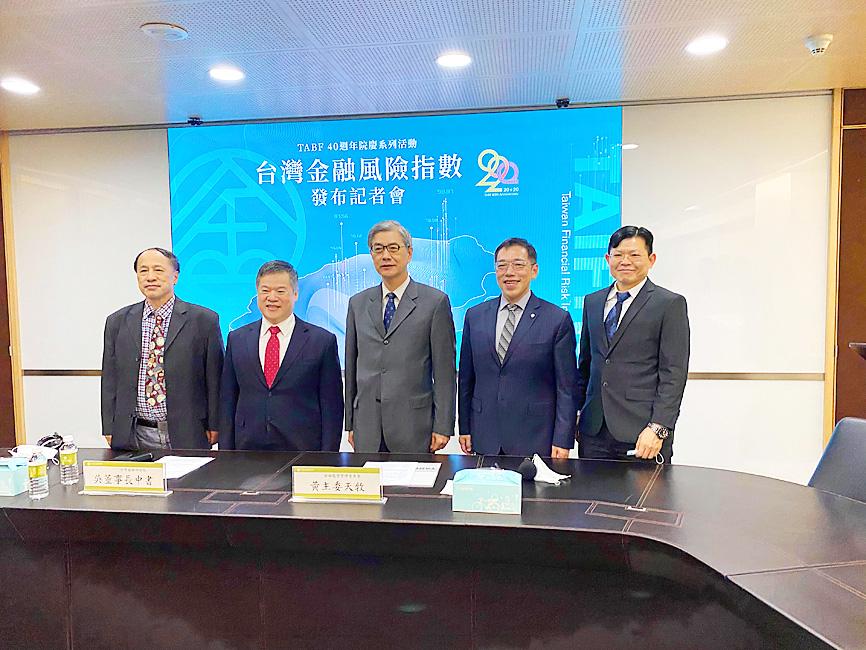The nation’s financial risks remain low, but rising housing prices, lending risks in banks’ overseas branches and stock market volatility need to be monitored, the Taiwan Academy of Banking and Finance (TABF, 台灣金融研訓院) said yesterday at the launch of its Taiwan Financial Risk Index.
The index fell to 98.11 last month, from 98.71 a month earlier and 101.28 in March, indicating that financial risks had been declining since the COVID-19 outbreak, TABF president Hank Huang (黃崇哲) told a news conference in Taipei.
However, it has not returned to pre-pandemic levels, with the index standing at 97.85 in January, Huang said.

Photo: Wu Chia-ying, Taipei Times
The nation’s first self-developed financial risk indicator, the index is composed of four sub-indices: asset valuation risk, systemic stress in the financial sector, potential instability in the non-financial sector, and spillover and contagion risks.
A reading of below 100 indicates low financial risks, while a reading above the threshold suggests higher risks, the nonprofit organization said.
The institute spent two years compiling the index based on the European Central Bank’s financial stability risk index.
It helps regulators enhance supervision and benefits academic research, Financial Supervisory Commission Chairman Thomas Huang (黃天牧) said.
A closer look at the index shows that asset valuation risk, which measures volatility in the stock market, real-estate market and corporate debt, was 101.63 last month, down from 103.4 in October.
However, it remained above 100, reflecting an overheated property market, with rising housing prices and commercial office rents, the institute said.
Systemic stress in the financial sector — calculated based on banks’ loan-to-deposit ratio, capital adequacy, non-performing loan ratio and coverage ratio — fell from 95.4 to 94.2, while stability in the non-financial sector — based on banks’ corporate loans and investment in corporate bonds — also slid from 93.6 to 92.9, it said.
However, spillover and contagion risks climbed to 104.3 from 103.4, ending a three-month decline, as more countries saw a spike in COVID-19 cases, boosting the risks for loans by banks’ overseas branches, TABF said.
Still, it was lower than the peak of 113.2 in March, the data showed.

Taiwan will prioritize the development of silicon photonics by taking advantage of its strength in the semiconductor industry to build another shield to protect the local economy, National Development Council (NDC) Minister Paul Liu (劉鏡清) said yesterday. Speaking at a meeting of the legislature’s Economics Committee, Liu said Taiwan already has the artificial intelligence (AI) industry as a shield, after the semiconductor industry, to safeguard the country, and is looking at new unique fields to build more economic shields. While Taiwan will further strengthen its existing shields, over the longer term, the country is determined to focus on such potential segments as

UNCERTAINTY: Innolux activated a stringent supply chain management mechanism, as it did during the COVID-19 pandemic, to ensure optimal inventory levels for customers Flat-panel display makers AUO Corp (友達) and Innolux Corp (群創) yesterday said that about 12 to 20 percent of their display business is at risk of potential US tariffs and that they would relocate production or shipment destinations to mitigate the levies’ effects. US tariffs would have a direct impact of US$200 million on AUO’s revenue, company chairman Paul Peng (彭雙浪) told reporters on the sidelines of the Touch Taiwan trade show in Taipei yesterday. That would make up about 12 percent of the company’s overall revenue. To cope with the tariff uncertainty, AUO plans to allocate its production to manufacturing facilities in

COLLABORATION: Given Taiwan’s key position in global supply chains, the US firm is discussing strategies with local partners and clients to deal with global uncertainties Advanced Micro Devices Inc (AMD) yesterday said it is meeting with local ecosystem partners, including Taiwan Semiconductor Manufacturing Co (TSMC, 台積電), to discuss strategies, including long-term manufacturing, to navigate uncertainties such as US tariffs, as Taiwan occupies an important position in global supply chains. AMD chief executive officer Lisa Su (蘇姿丰) told reporters that Taiwan is an important part of the chip designer’s ecosystem and she is discussing with partners and customers in Taiwan to forge strong collaborations on different areas during this critical period. AMD has just become the first artificial-intelligence (AI) server chip customer of TSMC to utilize its advanced

Chizuko Kimura has become the first female sushi chef in the world to win a Michelin star, fulfilling a promise she made to her dying husband to continue his legacy. The 54-year-old Japanese chef regained the Michelin star her late husband, Shunei Kimura, won three years ago for their Sushi Shunei restaurant in Paris. For Shunei Kimura, the star was a dream come true. However, the joy was short-lived. He died from cancer just three months later in June 2022. He was 65. The following year, the restaurant in the heart of Montmartre lost its star rating. Chizuko Kimura insisted that the new star is still down